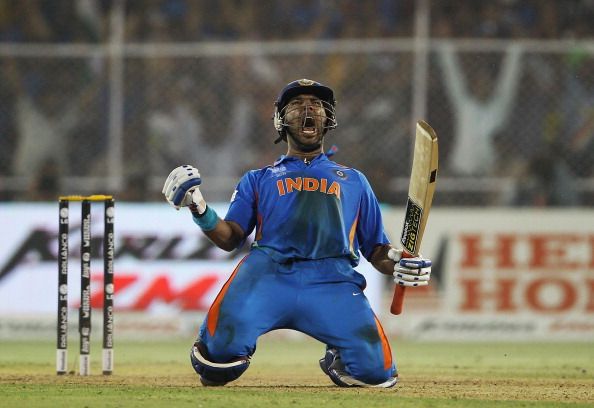
Yuvraj and his extraordinary comeback: insights from his handwriting
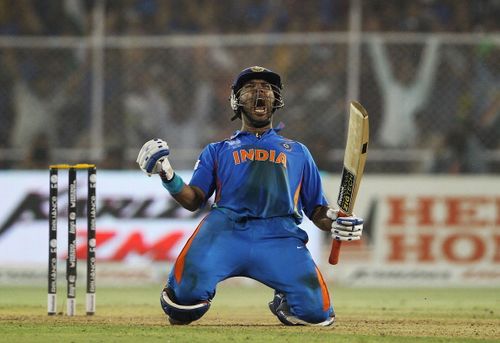
Yuvraj Singh celebrates hitting the winning runs during the 2011 ICC World Cup Quarter Final against Australia at Sardar Patel Stadium on March 24, 2011 in Ahmedabad, India. (Getty Images)
Over the last year or two, the name Yuvraj Singh has become synonymous with many impact words like victory, comeback, glory, perseverance, hard work and survivor.
The last one epitomizes his journey he has taken in the past couple of years. His story is almost surreal. Diagnosed with a cancerous tumour within a month of being the Player of the Tournament for 2011 Cricket World Cup, he was representing his country and playing rigorous international cricket again in just over a year.
It’s a story that reflects life at its best. Nothing is certain in life: when you are at the zenith, evil omens queue up and you’re are bogged down by despair. Yuvraj obviously had luck and support by his side. He also got the best possible treatment. But looking at the long list of high-profile personalities who lost their battle with cancer, one needs more than just vanilla luck to surpass the deadly situation.
While things like getting treatment started as early as possible is key, one must exhibit a mental strength to survive cancer. And Yuvraj did that and more. He’s more than just a survivor.
Within months after his cancer treatment, he went through the hard pain of training, committed himself to domestic Cricket and was selected to play for India. What he did was mind boggling and got me looking for parallels of this achievement in history. Disgraced cyclist Lance Armstrong comes to mind, but the less said about him, the better.
Not so long ago, I heard the story of Anna Bretan from California. She may not be a household name but she did something extraordinary. Within 6 weeks of delivering a baby girl, Anna participated in Oakland Marathon and won with a time of 2:57:33 (a Full marathon, mind you, is 42.1 km).
It’s stories like these that helps one regain faith in life. It also motivates and inspires us to deal with obstacles heads on. These stories helps one believe that no matter how down and out you are, tomorrow can indeed be better day.
Yuvraj Singh’s handwriting sample:
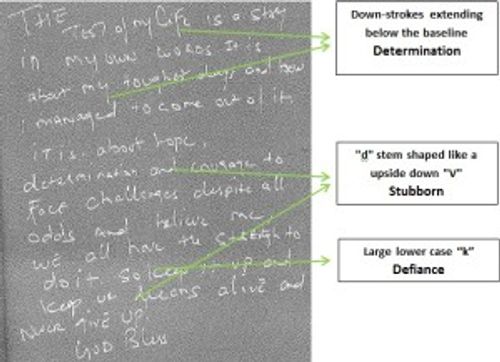
Yuvraj’s handwriting sample. (Note: click on the image to enlarge it)
Story behind Yuvraj’s handwriting sample:
I recently read the book, ‘Yuvraj – The Test of My Life from Cricket to Cancer and Back.’ This book is a biography of sorts as it looks at the various aspects of his life, but with a focus on his fight with cancer. The initial pages of this book had a message with Yuvraj’s handwriting. As interesting as the book was, I was excited to see his handwriting that helped me analyse his personality.
What personality traits helped Yuvraj Singh make a comeback?
As a part of what is written in the next few paragraphs, the focus is on a few strong traits that helped Yuvraj stage an almost impossible comeback:
Stubbornness:
Wikipedia defines stubbornness as, “a description of someone who is seen by others to steadfastly refuse to change their opinions, despite being presented with what others consider are good reasons to do so.”
A stubborn person thinks he is always right and takes a stand. He may not even look at the other side and weigh other possibilities.
His handwriting clearly shows visible signs of stubbornness in his personality. Funnily enough, in his biography, Yuvraj mentions that he knows he can sometimes be extremely stubborn.
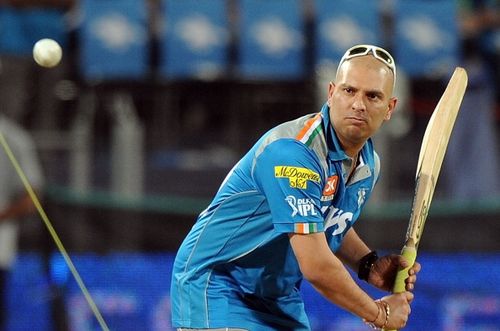
Yuvraj Singh pictured here on April 26, 2012 after recovering from a cancerous tumour before an IPL game. Months later he would make an astonishing comeback to international cricket. (GettyImages)
“I know I am a dheet. Not easy to translate into English but it means I am a kind of person who can make the stubborn people of the world look flexible and obliging.”
By its definition, it may give one an impression that stubbornness is a negative personality trait. In my experience, it’s often not all that right to classify human traits as good or bad because a given trait could be good or bad depending upon the context or the lens we choose to see them in.
During the early stages of his fight with cancer, Yuvraj was stubborn to accept that he had a tumour that could be life-threatening (even on insistence of his Doctors). Without realising the gravity of the situation, he instead played the Test series as he didn’t want to lose an opportunity to seal his spot.
And later during his fight with cancer, it was his stubborn personality that he made sure the disease wouldn’t bog him down. No matter how miserable and weak chemotherapy made him, it was his stubbornness that gave the mental strength to face up against the biggest opposition in his life.
Defiance:
A defiant person is the one who resists the authority of others. This trait is often seen as resentment and one can be labelled as a rebel. A defiant person doesn’t like to be “managed” and is always alert for any sign of unjust authority.
There is an interesting story in Yuvraj’s biography about the days when he started practicing cricket. He was practicing at a club with his father, Yograj Singh, in his early days and Navjot Singh Sidhu happened to be in the same club. His father (a former Test cricketer himself) requested Sidhu to assess his son playing. Sidhu on seeing him practice had said that Yuvraj was not made for cricket and showed no promise.
His dad on hearing this apparently said to Yuvraj, “Apna basta utha aur ghar chal. Ab mein dekhta hoon ki tu cricket kaise nahi khelta.” That literally translates to, “Pack your stuff, we are going home. I’ll see how you don’t play cricket now.”
The origins of defiance could arguably be traced back this incident. This, like stubbornness, too can be seen as a negative trait but this is also a trait needed in leadership situations.
Yuvraj remained defiant throughout his treatment and didn’t let lose hope and eventually has come back stronger.
There is another interesting anecdote in his biography that speaks about defiance in his personality. During his treatment, on one of the better days, one of his friends challenged him to a game of Table Tennis and said he wouldn’t be able to beat him.
The stage was set and Yuvraj, still weak due to his ongoing treatment, lost the first set of games 3-0. Even though he was physically fading and vomiting during the game, he asked for another set of games and made sure that he won 3-0 before he left the table.
Determination:
Determination simply is firmness of purpose; resoluteness.
Yuvraj’s handwriting shows the clear traces of determination. Determined people hold on to a positive belief and ingrain that solidly in mind to sail through the tough times in life. Holding on to positive beliefs makes one a believer from a non-believer.
At the start of chemotherapy sessions, Dr. Einhorn who treated Yuvraj said, “After three cycles, you could walk out of here like a man who never had cancer.”
As Yuvraj points out, “I remembered what Kapil Dev had said to us in the dressing room once when he came to speak to us. He said that there is an old adage, which is annoying to hear in good times and wonderful to hear in bad times: This too shall pass.”
Rather than allowing himself to be fully distraught, Yuvraj continued to make himself more determined during the course of treatment and emerged victorious.
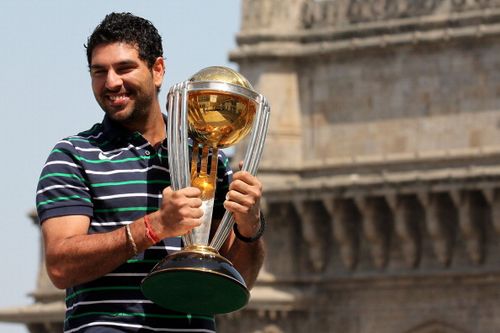
Yuvraj Singh of the Indian cricket team poses with the ICC Cricket World Cup Trophy, with the Gateway of India in the backdrop, on April 3, 2011 in Mumbai, India. (Getty Images)
It was his determination that led to him training in just a month after his return to India post-treatment. A few months later, he was back to playing all 3 formats of the game; one of the most unbelievable things to have happened.
It’s only fair to say that Yuvraj Singh staged the most grand and difficult comeback in cricketing history. The media often labelled him with varied and untoward adjectives during his early days but his comeback is testament to the fact that the man from Punjab is special. He is an inspiration to people who tend to give up so easily on seemingly trivial things.
Here’s wishing more power to Yuvraj in all his endeavours and especially towards Youwecan (a foundation to generate awareness and facilitate early detection of cancer) and success with both bat and ball.